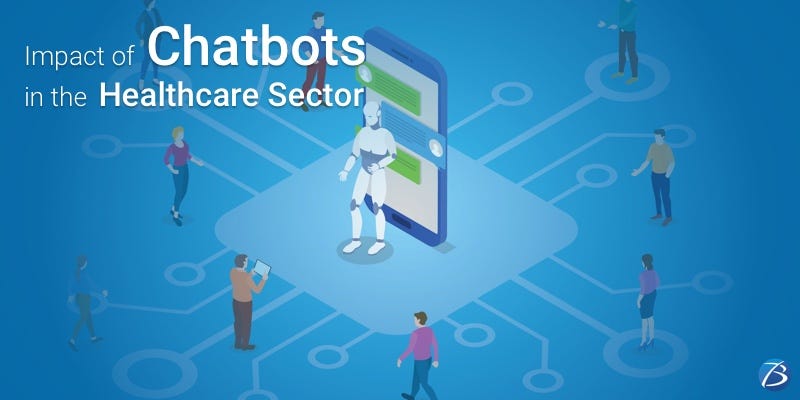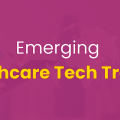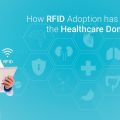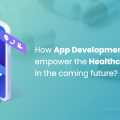A Short Guide on How Chatbots are Influencing the Healthcare Sector!


According to the market forecast of AIMultiple, an emerging portal that performs transparent and data-driven research on technologies like AI, IoT, RPA, etc., the AI and chatbot industry is booming. Their reports depict the following estimations:
- Chatbots save about $0.70 per interaction
- The global chatbot market may reach $1.3 Billion by the year 2025
- Almost 50% of large-scale companies are thinking of investing in the chatbots
It is evident from these numbers that machine learning and AI-based chatbots are becoming a new craze in the industrial world.
The healthcare sector too has leveraged this technology. In 2021, the healthcare chatbots have proved all the more beneficial as remote patient treatment was in high demand due to the Covid-19 pandemic. So, needless to say, this breakthrough technology is going to transform the healthcare sector in myriad ways.
Vital Role of Smart Chatbots in Healthcare Solutions and Services
So, what exactly is a chatbot? Well, it is a kind of web-robotic application that runs on machine learning algorithms; which fall under artificial intelligence. A chatbot possesses human-like conversational skills and is designed to run automated commands while interacting online.
In the healthcare industry, these super-responsive AI-enabled chatbots are mostly used as a conversationalist or a healthcare consultant for providing accurate information instantly. They facilitate seamless interactions between patients and doctors or other care providers. A few top-notch examples of healthcare bots are Sensely, Babylon, ABBI, SafeDrugBot, Ada, Florence, etc.
Furthermore, these bots can enhance the accuracy of ailment identification and symptom detection, and also help to assist in preventive care, feedback processes, post-recovery guidance, etc. They help to perform mundane tasks like sending emails, providing simple solutions, lead generation, marketing, result analysis, etc. So, as these chatbots can handle simple tasks, the healthcare staff and medical professionals can focus on more important tasks. Owing to this, healthcare app development agencies across the globe have gradually started to architect innovative and smart chatbots.
Major Categories of Healthcare Chatbots in the Market
Information-Oriented Bots
These bots aim towards answering the queries of the patient by providing apt information and keeping the conversations simple, creative and non-repetitive.
Task-Oriented Bots
These bots are meant to guide the health workers in providing virtual health check-ups to the patients and also schedule timely appointments.
Open/Close Domain Bots
As the name suggests, these are domain-specific bots that provide detailed data of the diseases, their symptoms, and related health issues to the patients.
These were major categories in which the bots are divided. Based on these, there are diverse bots designed in the market, such as healthcare appointment selector bots, bots for patient treatment feedback, bots for dental clinics, bots providing coupon promotions for therapists, bots providing sex education, fitness assistance bots, health insurance bots, and FAQ chatbots.
Practical Benefits of AI Chatbots in the Healthcare Sector

Answering FAQs and Providing Relevant Information
Usually, most of the patients keep asking the same repeated and basic questions to the healthcare facilities on their websites or applications. In this case, intelligent chatbots can prove extremely beneficial. Bots have aptly programmed responses and they address the frequently asked questions instantly with much accurate information, even though the questions are related to a wide range of health conditions.
Customer Service for Enhanced Patient Engagement
Bots act as a tool that facilitates instant and continuous interaction with patients. This can drastically improve patient satisfaction as well as retention. The concerns of patients are resolved immediately which boosts engagement and builds trust in them.
Scheduling Appointments
Bots can help the patients to book appointments easily and also assign a particular doctor to them. They can send a confirmation email to the doctor and book an available slot as per the availability of both parties. This way scheduling online appointments becomes an effortless task with bots.
Primary Patient Care and Assistance
Nowadays, any type of information is just a click away. But the drawback of this facility is that people can easily get access to misleading or incorrect health information. This may lead to severe health conditions too. However, carefully designed chatbots can be utilized to provide the right information when it comes to primary patient care and also emergency first aid.
Detection of Symptoms and Ailment
A chatbot helps in the detection of ailments that patients have by asking some simple questions related to the ailments and analyzing the patient’s health history. Thus, patients can use bots for identifying certain ailments and measure the severity of their health conditions using bots.
Claims and Coverage
In case the patients want to file for claims, the bot can check their existing coverage, track the status of a claim, it will easily provide them the relevant information they require. Besides, doctors too get seamless access to patient data and their queries. So they can proactively authorize billing payments and related requests that patients or healthcare authorities may ask.
Latest updates about the Drugs to Medical professionals
There are high chances that medical professionals can miss out on information of the latest drugs or researches made. These updates can be crucial for treating patients. In this case, bots can be used for dispensing the right and updated information of the drugs to those medical professionals.
Research and Suggestive Treatment
Chatbots can be highly beneficial when it comes to research and suggestive treatment. They have already made some contributions in areas like telemedicine, health records, radiology, imaging, etc.
Concluding Words:
Gradually, AI chatbots are becoming a new normal in the healthcare domain. They are not only flawlessly communicating with the patients or the end-users but also digitalizing a host of other functionalities in the healthcare organizations. These chatbots are highly intelligent and with some human assistance, they can empower several small and large healthcare centers to operate seamlessly and improvise their functioning to a great extent. No wonder why every existing healthcare app development company is on the verge of designing smart chatbots to meet the expectations of this highly competitive market.
Hopefully, this blog has given you insights into how healthcare chatbots have influenced the healthcare industry.
Do comment below or get in touch, for any further details on this topic.
To know more about our core technologies, refer to links below:
Other articles and publications:
Articles and publications of other companies:
- +1 (469) 277-0804
- 8305 Tripoli Trl, Frisco, TX 75034, United States
- www.biz4solutions.com/












